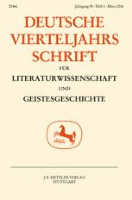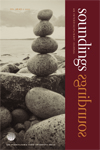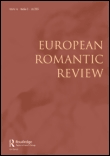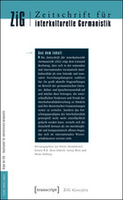
DEUTSCHE VIERTELJAHRSSCHRIFT FUR LITERATURWISSENSCHAFT UND GEISTESGESCHICHTE
Scope & Guideline
Fostering Insights into the Dynamics of Thought and Culture.
Introduction
Aims and Scopes
- Literary Studies and Intellectual History:
The journal emphasizes the relationship between literary texts and their historical contexts, often exploring how literature reflects and influences intellectual movements. - Cultural Critique and Aesthetics:
It investigates aesthetic theories and the role of art within society, focusing on how cultural artifacts engage with ideas of beauty, power, and ethics. - Interdisciplinary Approaches:
The journal encourages interdisciplinary research that integrates insights from philosophy, theology, sociology, and cultural studies to deepen the understanding of literature. - Historical Contextualization:
A consistent focus on historical periods, especially the Enlightenment, Romanticism, and modernity, allows for a nuanced examination of how literature interacts with the social and political landscapes of its time. - Thematic and Textual Analysis:
The journal promotes detailed textual analyses that connect literary works with broader thematic concerns, including identity, memory, and the socio-political implications of narrative.
Trending and Emerging
- Contemporary Literature and Social Issues:
There is an increasing focus on how contemporary literature engages with social issues, including identity politics, environmental concerns, and the implications of digital culture. - Intermediality and Hybrid Forms:
Research exploring intermediality, where literature interacts with other media forms (film, digital, visual arts), is on the rise, reflecting a broader interest in how narrative is constructed across different platforms. - Postcolonial and Global Perspectives:
Emerging themes include postcolonial critiques and global perspectives on literature, which challenge Eurocentric narratives and promote diverse voices in literary discourse. - The Role of Memory and Trauma in Literature:
Increasingly, scholars are investigating themes of memory, trauma, and the politics of representation in literature, particularly in relation to historical events and collective identities. - Theoretical Innovations in Literary Criticism:
There is a trend towards innovative theoretical frameworks, including queer theory, ecocriticism, and affect theory, which are reshaping traditional literary analyses and offering fresh perspectives.
Declining or Waning
- Traditional Literary Canon:
There is a noticeable decline in articles focusing on the traditional literary canon, as contemporary scholarship increasingly seeks to interrogate and expand beyond established texts and authors. - Historical Narratives of Literature:
Themes centered around linear historical narratives, which traditionally dominated literary scholarship, are becoming less frequent as scholars favor more fragmented and multi-faceted approaches to understanding literary history. - Biographical Criticism:
Research that heavily relies on biographical criticism, focusing on authors' lives as the primary lens for understanding their works, appears to be waning in favor of more abstract and thematic analyses. - Formalism and Structuralism:
Approaches grounded in formalist and structuralist methodologies are less prevalent, as there is a shift towards contextual and post-structuralist readings that prioritize the socio-political dimensions of texts.
Similar Journals

Al-Shajarah
Fostering Insightful Discourse on Islamic CivilizationsAl-Shajarah is an esteemed academic journal that serves as a vital platform for scholarly discourse in the fields of Cultural Studies, History, Philosophy, and Religious Studies. Published by the International Islamic University Malaysia and the International Institute of Islamic Thought and Civilization, the journal reflects a profound commitment to advancing understanding and dialogue surrounding Islamic thought and its place in modern society. With an ISSN of 1394-6870 and an evolving publication history since its convergence in 2011, Al-Shajarah offers valuable insights that cater to a broad array of readers, from seasoned researchers to emerging academics. The journal's rigorous peer-review process and commitment to cultural and religious scholarship are underscored by its categorization in the Q3 and Q4 quartiles in critical academic fields, and its Scopus rankings demonstrate its relevance within the global academic landscape. While open access is not currently available, Al-Shajarah remains a crucial resource for those seeking to enrich their understanding of Islamic civilizations and philosophy, providing access to pioneering research that shapes the conversation within these disciplines.

SOUNDINGS
Exploring the Depths of Cultural DiscourseSOUNDINGS, published by Penn State University Press, stands as a notable journal within the realms of the arts and humanities, cultural studies, and sociology and political science. With its ISSN 0038-1861 and E-ISSN 2161-6302, this academic periodical has been a platform for critical discourse and innovative research since its inception in the mid-1970s, although it has experienced several convergence periods. Though currently categorized in Q4 within its respective fields, including rankings that reflect its growing influence, SOUNDINGS continues to provide a rigorous space for interdisciplinary dialogue and scholarly reflection. Despite the absence of open access, the journal’s comprehensive articles are vital for researchers, professionals, and students seeking to deepen their understanding of complex cultural and societal dynamics. With its headquarters located at 820 North Univ Drive, U S B 1, Ste C, University Park, PA 16802, SOUNDINGS invites its readership to engage with contemporary issues through a rich lens of academic inquiry.

POETICA-ZEITSCHRIFT FUR SPRACH-UND LITERATURWISSENSCHAFT
Cultivating a Rich Understanding of Language and Literary ExpressionPOETICA-ZEITSCHRIFT FUR SPRACH-UND LITERATURWISSENSCHAFT is a pivotal journal published by Brill, focusing on the fields of linguistics and literary studies. Founded in Germany, this esteemed publication showcases rigorous scholarly research, fostering a deeper understanding of language and literature. Although the journal does not currently operate as an open-access platform, it remains an essential resource for academics in these areas, featuring innovative studies that span from 2002, through selected years, to 2024. With a Q4 category in Linguistics and Language and a Q3 in Literature and Literary Theory as of 2023, POETICA ranks among the significant contributors to the arts and humanities discourse. It provides a vital forum for researchers and students to engage with contemporary debates and methodologies, ensuring its relevance and importance in the academic community.

European Romantic Review
Advancing Scholarly Discourse in Romantic StudiesEuropean Romantic Review is a distinguished journal published by Routledge Journals, Taylor & Francis Ltd, focusing on the critical exploration of Romantic literature and its cultural impact. Since its inception in 1990, the journal has been a vital platform for scholarly discourse in the fields of Cultural Studies and Literature and Literary Theory, with an esteemed ranking in the 61st percentile for its contributions to the literature domain. Despite not being open access, European Romantic Review provides valuable insights to researchers, offering a rich repository of articles that engage with the complexities of Romantic thought, authorship, and aesthetics. The journal's commitment to advancing academic knowledge makes it an essential read for scholars, professionals, and students interested in the nuances of the Romantic era and its lasting influence on contemporary discourse.

Zeitschrift fur Interkulturelle Germanistik
Fostering Scholarly Exchange in Intercultural GermanistikZeitschrift für Interkulturelle Germanistik is a leading academic journal specializing in the field of intercultural studies and German linguistics. Published by TRANSCRIPT VERLAG, this journal serves as a platform for innovative research, critical essays, and interdisciplinary discussions that explore the complexities of cultural interactions within the German-speaking world and beyond. With a commitment to fostering scholarly exchange, the journal invites contributions that delve into themes such as language, identity, migration, and cultural dialogue. Although the journal does not currently offer open access, its robust editorial standards are aimed at providing readers with high-quality, peer-reviewed content. Researchers, professionals, and students engaged in German studies will find this journal an invaluable resource for the latest findings and theoretical advancements in intercultural communication and Germanistik. For more information, visit TRANSCRIPT VERLAG's official page.

Logos
Exploring the Depths of Cultural NarrativesLogos, published by the GAIDAR Institute for Economic Policy, is a pivotal journal serving the fields of Cultural Studies, Literature and Literary Theory, and Philosophy. Operating under the ISSN 0869-5377 and E-ISSN 2499-9628, Logos provides a rigorous platform for intellectual discourse and scholarly contributions from Russia and beyond. With a Q3 ranking in 2023 across its categories, this journal is recognized for its commitment to advancing research and dialogue in the humanities, evidenced by its Scopus rankings where it places in the 59th percentile for Literature and Literary Theory and the 37th percentile for Philosophy. Since its inception in 2016, Logos has become a significant resource for researchers and students alike, offering access to a wide array of theoretical perspectives and empirical studies. While currently not an open access journal, its relevance in contemporary academic discussions ensures it remains a vital reference point for those seeking to understand the complexities of cultural and philosophical narratives.

BIBLIOTHEQUE D HUMANISME ET RENAISSANCE
Charting the Course of Cultural Evolution in Renaissance Studies.BIBLIOTHEQUE D HUMANISME ET RENAISSANCE is a prestigious academic journal that delves into the rich fields of humanism and Renaissance studies, providing a platform for scholarly discourse and critical analysis. Published by LIBRAIRIE DROZ SA, this journal has carved a niche for itself in the study of literature, philosophy, history, and culture during one of the most transformative periods in European history. Though currently not listed as Open Access, its rigorous peer-review process ensures that published articles meet the highest academic standards, making it an invaluable resource for researchers, professionals, and students alike. While it has experienced some fluctuations in coverage over the years, spanning various intervals since its inception in the 1970s, it continues to contribute significantly to the intellectual landscape of Renaissance studies. As scholars seek to understand the complexities of human thought and artistic expression from this vibrant era, BIBLIOTHEQUE D HUMANISME ET RENAISSANCE stands out as a vital repository of knowledge and insights.

Cartaphilus
Empowering Voices in the HumanitiesCartaphilus is a distinguished academic journal published by UNIV MURCIA, focusing on a multidisciplinary approach to the humanities and social sciences. Based in Spain, the journal aims to foster dialogue and collaboration among researchers, practitioners, and students in these fields. Although specific metrics like the impact factor and H-index are currently not available, Cartaphilus strives to be a vital resource for original research, innovative ideas, and critical discourse, contributing to the advancement of knowledge in the humanities. The journal is particularly valuable for scholars seeking an open platform for their work, as it emphasizes accessibility and inclusivity in scholarly communication. By bridging various disciplines and perspectives, Cartaphilus plays a crucial role in the academic landscape, encouraging new insights and enriching the scholarly community.

Studia Theodisca
Bridging Disciplines, Enriching MindsStudia Theodisca is a distinguished academic journal published by Milano University Press that has been contributing to the fields of Cultural Studies and Literature and Literary Theory since its inception. With an ISSN of 1593-2478 and E-ISSN 2385-2917, this Open Access journal, available since 1994, ensures that research is freely accessible, fostering a global exchange of ideas. Located in Milan, Italy, the journal has gained traction within the academic community, reflected in its rankings: Q4 in Cultural Studies and Q3 in Literature and Literary Theory as of 2023. Despite its relatively new presence in Scopus, being placed in the ranks of 733 out of 1106 for Literature and Literary Theory and 1092 out of 1304 for Cultural Studies, it remains committed to advancing scholarly dialogue and exploring diverse narratives. Studia Theodisca serves as a vital platform for researchers, professionals, and students seeking to engage with innovative contributions and contemporary thought in these dynamic areas of study.

MERKUR-DEUTSCHE ZEITSCHRIFT FUR EUROPAISCHES DENKEN
Illuminating Intellectual Traditions in EuropeMERKUR-DEUTSCHE ZEITSCHRIFT FUR EUROPAISCHES DENKEN is a prestigious journal published by Klett-Cotta Verlag, dedicated to the exploration of European thought, culture, and intellectual discourse. With an ISSN of 0026-0096, this journal provides a platform for critical analysis and reflection on a wide array of topics within the fields of Arts and Humanities, Cultural Studies, and Sociology. Although coverage in Scopus was discontinued in 2014, MERKUR maintains a significant historical footprint, having previously ranked #76 in Arts and Humanities and #519 in Cultural Studies. This underscores its role in contributing to scholarly conversations regarding European intellectual traditions. The journal, located at Rotebühlstraße 77, D-7004 9 Stuttgart 1, Germany, while not open access, remains an essential resource for researchers, professionals, and students alike, keen on examining the contours of European thinking and its implications in contemporary society.